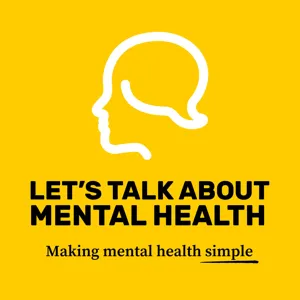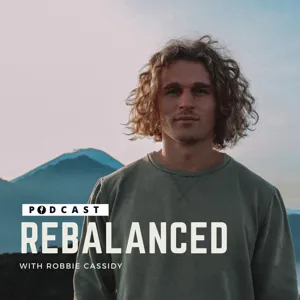Podcast Summary
Understanding the difference between work addiction and healthy work ethic: Workaholism is defined as excessive and compulsive work behavior, leading to impairment in other areas of life. Recognizing the signs and understanding the difference between circumstances and aspirations is essential for maintaining balance and overall well-being.
Workaholism goes beyond a strong work ethic and dedication to goals. It becomes problematic when it becomes compulsive and excessive, leading to impairment in other areas of life. Workaholism is defined as the drive to work excessively and compulsively, or being overly concerned about work with an uncontrollable work motivation. It's important to differentiate this from a healthy pursuit of goals and aspirations. Research by Cecily Andreasson, such as the 2014 article "Workaholism: An Overview and Current Status of the Research," and the 2016 study "The Relationships Between Workaholism and Symptoms of Psychiatric Disorders," provide valuable insights into this topic. Understanding the difference between circumstances and aspirations, and recognizing when work becomes a harmful addiction, is crucial for maintaining balance and overall well-being.
Understanding Workaholics vs. Long Working Hours: Workaholics use work as an escape from personal issues, while long working hours can be due to job demands or passion. Recognize the importance of work-life balance and prioritize various aspects of life.
The term "workaholic" can be misleading as it doesn't account for external pressures or the passion people have for their work. It's essential to distinguish between those who work long hours due to external factors, such as financial necessity or job demands, and those who use work as a coping mechanism to avoid other painful experiences or emotional stressors. Workaholics employ work as a strategy to escape, often from unresolved relationships or difficult emotions. However, not all individuals who work long hours can be classified as workaholics. Those in service industries or those who genuinely love their work may also put in extensive hours. Burnout, which is related to workaholism, occurs when the demands of a job exceed an individual's capacity to cope, regardless of their passion for the work. It's crucial to recognize that work-life balance is essential, and prioritizing various aspects of life, including family and self-care, is necessary for long-term harmony and well-being.
Fear of criticism fuels workaholism: Our internalized audience can drive us to become workaholics based on imagined criticism. People generally care less about our work than we assume.
Our fear of criticism and uncertainty can drive us to become workaholics as a way to appease our internalized audience. We imagine how they might react to our work and make decisions based on that anticipation. The internalized audience often holds more weight than the objective external audience in cultures where there is less familial or societal pressure. It's essential to remember that people generally care less about our work than we think and that our internal narratives and concerns often overshadow reality. Practicing self-awareness and reflecting on the potential discrepancy between our fears and actual outcomes can be a helpful exercise in managing workaholism.
Staying present and aware of external audiences: Reflecting on motivations and past experiences can lead to more effective relationships and authentic self-expression, rather than being preoccupied with internalized audiences or workaholism driven by external validation.
Being fully present and aware of external audiences, rather than being preoccupied with an internalized audience, can lead to a more effective and authentic way of navigating relationships and experiences. This can be achieved by asking reflective questions and focusing on the psychological factors within ourselves that we have more control over. Workaholism can also stem from a desire to fill our self-worth through external success and approval, rather than from within. Reflecting on past experiences and the influence they have had on our present behaviors can provide valuable insights into our motivations and help us make positive changes.
Motivations for Working Long Hours: Noble and Not So Noble: People work long hours for various reasons, some driven by personal growth, others by external rewards, and some by unhealthy patterns. It's essential to reflect on our motivations and consider the role of our environment and talents in shaping our habits.
People's motivations for working long hours can stem from various sources, some noble and some not so much. The speaker shares how their own motivations included a neurotic seeking of narcissistic supplies. However, even if the goal is unreasonable, the strategy to achieve it might be reasonable under the circumstances. For instance, working long hours to climb the career ladder can be a sensible approach. It's also essential to consider the role of the environment and the rewards we receive. Someone who is naturally good at emotional intelligence and social skills might spend long hours nurturing relationships, and this wouldn't be considered workaholism, but rather the expression of their gift. Ultimately, we can get captured by our talents and the rewards they bring, leading us to keep repeating the same patterns in our lives.
Workaholism: A Harmful Coping Mechanism for Depression and Anxiety: Workaholism, similar to substance addiction, can harm mental health and strain personal relationships due to societal validation of long hours and pressure to perform.
Workaholism, while often viewed as socially desirable, can be a harmful coping mechanism for depression and anxiety, much like substance addiction. The term workaholism actually stems from alcoholism and shares similar characteristics, such as tolerance and withdrawal. Moreover, workaholism is socially validated, with long hours often leading to promotions rather than disciplinary action. This dynamic can create significant tension in personal relationships, particularly in work-life balance situations. The guilt and pressure to perform can lead individuals to prioritize work over personal time, even when small changes could significantly improve their home life. This complex issue highlights the need for a nuanced understanding of workaholism and the societal pressures that reinforce it.
Improve health and appearance with simple solutions: Use topical peptides for aging skin, listen to science-based podcasts for health info, and recognize workaholism affects various demographics
There are simple yet effective solutions for addressing aging skin and improving overall health. For instance, using a topical peptide can help reduce the appearance of lines, wrinkles, and thinning skin. All it requires is cleansing, drying, and applying it twice daily. Additionally, resources like the ZOE Science and Nutrition podcast provide science-based information to help make informed health choices. This podcast, which is highly regarded and accessible on various platforms, offers practical advice on a range of health topics. It's essential to recognize that workaholism, often thought of as an issue for older white men in high-pressure jobs, can actually affect younger women, those in relationships, managers, self-employed individuals, and those with ADHD more frequently. This insight can help us better understand and address this issue. Overall, the key takeaway is that there are straightforward, evidence-backed methods for improving our health and appearance, and valuable resources available to support us in making informed decisions.
Exploring Workaholism in Queer Female Friend Group with Hyperfocus ADHD: Workaholism can affect individuals with Hyperfocus ADHD, and economic realities and job market pressures contribute to its prevalence. The Stages of Change model offers insights for addressing work-life imbalance, regardless of motivation.
Hyperfocus, a subtype of ADHD, can lead to excessive grinding tendencies and reinforcing behaviors, which may not fit the classic demographic qualifiers of workaholism. This was discussed in relation to a friend group, where a substantial subset identified as queer and female. The primary drivers of workaholism for many people, particularly younger generations, are economic realities and pressure to maintain performance in the competitive job market. While some may enjoy their work, others view it as a means to an end. The stages of change model, often used in addiction circles, can provide insight into addressing workaholism, and it's essential to acknowledge that even those driven by passion can experience an out-of-balance work-life situation. Dan, as a therapist, can share his personal experience and insights as we further explore this topic.
Identifying your current stage of change: Expanding your perspective during the preparation stage can help you fully commit to change and believe in your ability to succeed by visualizing long-term benefits
Understanding the different stages of change can help individuals identify their current position and take steps to move forward. The stages include precontemplation, contemplation, preparation, action, maintenance, and sometimes relapse. The preparation phase is a critical moment where individuals must fully commit to change and believe in their ability to succeed. To help reach this point, it can be beneficial to adopt a wider perspective and consider the bigger picture, rather than focusing solely on the immediate desire or craving. By expanding one's perspective and visualizing the long-term benefits, it becomes easier to make the desired change and stick with it.
Considering the wider perspective of our actions: Reflecting on our future selves and long-term cost-benefit can help prevent problematic behaviors and make better decisions. Social support and a strong sense of identity are crucial elements of preparation.
Taking a moment to step back and consider the wider perspective of your actions can help prevent problematic behaviors. Cravings often lead to regret, so it's important to consider the long-term cost-benefit of our choices. Imagining ourselves in the future and reflecting on what we'll wish we had done can also be a helpful exercise in making better decisions. Social support and a strong sense of identity are crucial elements of preparation, providing accountability and a clear sense of self. By considering the larger view, reflecting on our future selves, and leaning on social and personal resources, we can make choices that bring us happiness and fulfillment in the long run.
Exploring the roots of workaholism and coping behaviors: To lead a fulfilling life, focus on understanding the reasons behind workaholism and coping behaviors, derive self-worth from multiple aspects, practice self-awareness, and ensure efforts align with deeper values and purpose.
Understanding and addressing the underlying reasons for workaholism and other coping behaviors is crucial for making conscious moral choices and leading a fulfilling life. Instead of focusing on who we want to be, it's essential to explore who we truly are and derive self-worth from multiple aspects beyond just professional achievements. By investigating the origins of our self-concept and practicing self-awareness, we can identify the stressors driving our behaviors and make choices that align with our values. Workaholism and addiction can stem from anxiety or other emotional pressures, and mindfulness can help us observe and address these motivations in real-time. Ultimately, it's not about reducing the amount of work we do, but rather understanding why we do it and ensuring our efforts align with our deeper values and sense of purpose.
The importance of being present in the moment: Being fully present and engaged in the moment can lead to greater well-being and a more expansive experience of time, despite having goals and aims. Practical interventions like tracking time and scheduling rest can help prioritize being over doing.
The ability to be fully present and engaged in the moment, rather than being preoccupied with becoming or constantly focused on the results of our actions, can lead to a greater sense of well-being and a more expansive, frictionless experience of time. This concept, which touches on ideas from psychology, Buddhism, and the work of Mihaly Csikszentmihalyi on flow, emphasizes the importance of being centered in the present moment while still maintaining goals and aims. Practical interventions such as tracking time and scheduling time off can help individuals become more aware of their work habits and prioritize rest and relaxation. By contrast, workaholism can create a sense of contraction and pressure, making it all the more important to prioritize being over doing.
Track time and prioritize effectively: Using a spreadsheet to categorize activities in 15-minute intervals helps increase awareness of habits and prioritize time effectively. Trusted individuals can also influence behavior and challenging limiting self-scripts contributes to a healthier work-life balance.
Tracking time and being mindful of how it's spent can have a significant impact on productivity and relationships. This simple intervention, which involves using a spreadsheet to categorize activities in 15-minute intervals, can help individuals become more aware of their habits and prioritize their time effectively. Additionally, giving trusted individuals the power to influence behavior and challenging limiting self-scripts can contribute to a healthier work-life balance. The speaker, a longtime psychologist, shared his personal experience of implementing these strategies and the positive effects they had on his family and career.
Re-engaging in passions and work post-break: Re-engaging in passions and work that aligns with our talents and values can be challenging but rewarding. Feed your 'neurotic pony' with positive experiences and social supplies to regain inner peace and passion.
Re-engaging in work or pursuits that align with our passions, talents, and values after taking a break can be a challenging process. It may require significant effort and time, but the rewards are worth it. As we gradually feed our "neurotic pony" with positive experiences and social supplies, the sense of something missing or driving us compulsively can fade away. Additionally, exploring the intersection of passion and peace can help us remain passionate about our work while maintaining inner peace. This episode, while focusing on workaholism, also offers valuable insights for dealing with any systemic behavioral issue.
Understanding Workaholism: Signs, Stages, and Solutions: Workaholism, a behavior driven by stress and societal pressures, affects various demographics, including self-employed individuals, women, and younger people. The Stages of Change Model offers a framework to recognize and address this issue, promoting self-care and balance.
Workaholism is a behavior driven by stress, avoidance of painful feelings, and societal pressures. It's a form of addiction that expands to fill the time available for its completion, and it's not limited to older, white men in high-pressure business environments. Instead, research suggests that self-employed individuals, women, and younger people are more likely to struggle with workaholism. To overcome workaholism, it's essential to recognize the signs and stages of the problem, from precontemplation to relapse. The Stages of Change Model can provide a framework for understanding and addressing this behavior, helping individuals prepare, take action, maintain new habits, and even cope with relapses. Ultimately, recognizing workaholism as a complex issue with deep cultural roots and personal consequences is the first step towards finding balance and prioritizing self-care.
Workaholism relapses are normal: Focus on addressing underlying feelings, practicing self-awareness, and developing a future self perspective to overcome workaholism relapses
Relapses are a normal part of the journey towards overcoming workaholism. People may slip up and fall short of their desired new way of being, but the key is to recommit and try again. Some effective interventions include addressing the underlying feelings that lead to workaholic tendencies, cultivating self-awareness or mindfulness practices, and developing a future self perspective. By focusing on these areas, individuals can gain valuable insights, relax anxiety, and make positive changes in their behavior. Remember, it's okay to stumble, the important thing is to keep moving forward.






